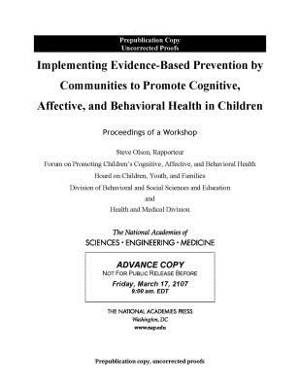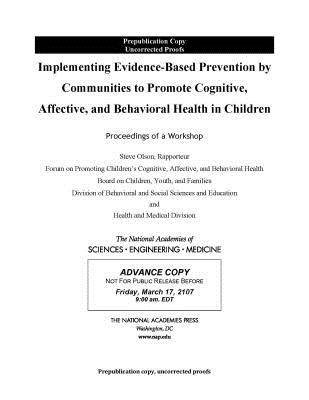
- Afhalen na 1 uur in een winkel met voorraad
- Gratis thuislevering in België vanaf € 30
- Ruim aanbod met 7 miljoen producten
- Afhalen na 1 uur in een winkel met voorraad
- Gratis thuislevering in België vanaf € 30
- Ruim aanbod met 7 miljoen producten
Implementing Evidence-Based Prevention by Communities to Promote Cognitive, Affective, and Behavioral Health in Children
Proceedings of a Workshop
National Academies of Sciences Engineering and Medicine, Health and Medicine Division, Division of Behavioral and Social Sciences and Education, Board on Children Youth and Families, Forum on Promoting Children's Cognitive Affective and Behavioral HealthOmschrijving
Communities provide the context in which programs, principles, and policies are implemented. Their needs dictate the kinds of programs that community organizers and advocates, program developers and implementers, and researchers will bring to bear on a problem. Their characteristics help determine whether a program will succeed or fail. The detailed workings of programs cannot be separated from the communities in which they are embedded.
Communities also represent the front line in addressing many behavioral health conditions experienced by children, adolescents, young adults, and their families. Given the importance of communities in shaping the health and well being of young people, the National Academies of Sciences, Engineering, and Medicine held a workshop in June 2016, to examine the implementation of evidence- based prevention by communities. Participants examined questions related to scaling up, managing, and sustaining science in communities. This publication summarizes the presentations and discussions from the workshop.
Specificaties
Betrokkenen
- Auteur(s):
- Uitgeverij:
Inhoud
- Aantal bladzijden:
- 106
- Taal:
- Engels
Eigenschappen
- Productcode (EAN):
- 9780309456470
- Verschijningsdatum:
- 14/07/2017
- Uitvoering:
- Paperback
- Formaat:
- Trade paperback (VS)
- Afmetingen:
- 150 mm x 226 mm
- Gewicht:
- 158 g

Alleen bij Standaard Boekhandel
Beoordelingen
We publiceren alleen reviews die voldoen aan de voorwaarden voor reviews. Bekijk onze voorwaarden voor reviews.











